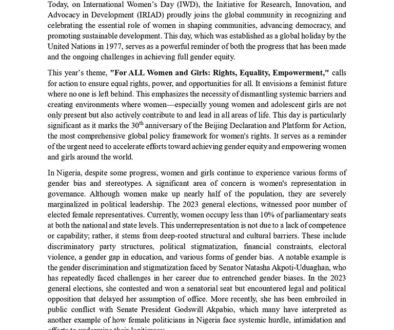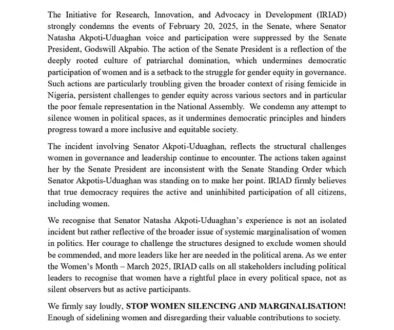Public Statement on Africa Day 2024
MAY 25, 2024
PUBLIC STATEMENT ON AFRICA DAY 2024
Through coordinated action, sustained investment, and a shared commitment to inclusive and quality education, we can create a future where every child on the African continent can receive a holistic and empowering education that prepares them for success in the 21st century and beyond.
Today, the Initiative for Research, Innovation, and Advocacy in Development (IRIAD) joins other progressive voices to commemorate Africa Day 2024. Africa Day marks the founding of the Organisation of African Unity (OAU), now known as the African Union, on May 25, 1963. It was originally called African Freedom Day and later African Liberation Day, reflecting its origins in the collective African resistance to colonialism and economic exploitation.
The African Union’s theme for Africa Day 2024, “Educate an African fit for the 21st Century: Building resilient education systems for increased access to inclusive, lifelong, quality, and relevant learning in Africa”, is a timely and crucial call to action. It recognizes the pivotal role of education in empowering Africans to meet the challenges of the 21st century and achieve the aspirations of Agenda 2063.
While some progress has been made, Africa still faces significant educational challenges. In 2023, over a quarter of school-age children were out of school, and 9 out of 10 could not read or write by age 10. Barriers such as lack of inclusivity, affordability, accessibility, and applicability continue to hinder equal access to quality education across the continent.
As with the broader African experience, the education sector in Nigeria faces significant challenges. The sector is confronted with several challenges including high out-of-school rates especially among girls and rural dwellers, shortage of qualified teachers, poor infrastructure, and underfunding. These challenges hinder the development of a skilled workforce and pose a significant obstacle to achieving Sustainable Development Goal 4 as well as Africa’s Agenda 2063 aspirations.
This year’s theme is also in line with IRIAD’s core values of knowledge exchange and inclusion. Through knowledge exchange, promoting inclusive education, and advocacy measures, IRIAD contributes her quota to the development of Africans who are equipped to thrive in the 21st century. We call on other stakeholders to join us as we strive towards building a resilient education sector in Africa by heeding the following call to action:
Call to Action for Stakeholders
- Government: The Nigerian government must prioritize education by increasing budgetary allocation to the sector. Implementing policies that ensure equitable access to quality education for all children, especially those in marginalized communities, is crucial for addressing the existing disparities.
- Development Partners and International Organizations: Increased support from development partners and international organizations is essential to enhance Nigeria’s education system. Targeted interventions focusing on marginalized groups can help bridge the existing gaps and improve educational outcomes across the country.
- Civil Society Organizations and Community Leaders: Active engagement in education advocacy is vital for driving positive change. Civil society organizations and community leaders play a pivotal role in promoting inclusive and relevant learning initiatives, advocating for policy reforms, and mobilizing resources to support educational development.
- Parents and Caregivers: Parents and caregivers are key stakeholders in ensuring the success of education initiatives. By prioritizing their children’s education, actively participating in school activities, and supporting their learning at home, parents can contribute significantly to improving educational outcomes and fostering a culture of lifelong learning.
- Private Sector: The private sector has a crucial role in investing in education initiatives that equip students with the skills and competencies needed for the 21st-century workforce. By partnering with educational institutions, offering mentorship programs, and supporting vocational training, private sector companies can contribute to building a skilled workforce that drives economic growth and innovation.
Through coordinated action, sustained investment, and a shared commitment to inclusive and quality education, we can create a future where every child on the African continent can receive a holistic and empowering education that prepares them for success in the 21st century and beyond.
#EducateAfrica2024 #InclusiveQualityLearning #AfricaEducationTransformation #BuildingResilientEducationalSystems
Signed
Princess Hamman-Obels
Director, IRIAD-The Electoral Hub
Phone: +234 9121551331 and + 234 9086998850
E-mail: electoralhub@gmail.com and comms.iriad@gmail.com
Twitter: @electoralhub and @iriadev
Instagram: @electoralhub, @theelectoralforum, and @iriadev
Facebook: @electoralhubng, @electoralforum, and @iriadev
LinkedIn: https://www.linkedin.com/company/the-electoral-hub/
https://www.linkedin.com/company/iriadev/
YouTube: https://www.youtube.com/@electoralhub1196
Website: https://www.iriadng.org and https://www.electoralhub.iriadng.org
ABOUT IRIAD AND THE ELECTORAL HUB
The Initiative for Research, Innovation, and Advocacy in Development (IRIAD) is an interdisciplinary knowledge and advocacy hub committed and focused on developing a critical understanding of governance processes and regimes from research, documentation, policy engagements, public education and impact advocacy.
The Electoral Hub is an affiliate of IRIAD. It is committed to promoting electoral knowledge, integrity, and accountability in Nigeria. Our aim is to strengthen electoral governance and accountability in Nigeria through the provision of data, critical and contextualized analysis, and solutions to improve the credibility and integrity of the electoral process.
….promoting electoral knowledge, accountability, and integrity
Knowledge | Innovation | Inclusion


